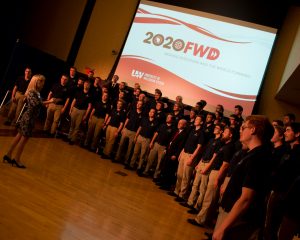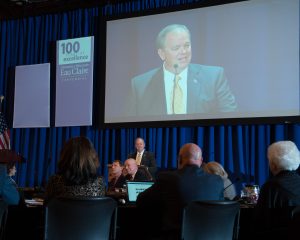EAU CLAIRE, Wis. – President Ray Cross announced Thursday that he is forming a University of Wisconsin (UW) System Business Council to advise the UW System about how the university can continue to best meet the needs of the state.
The Council will include key business and industry leaders in diverse fields from around the state.
“It is my expectation that the Council will help increase the dialogue with corporate and community leaders to foster alignment of the University with business and governmental stakeholders,” said Cross, at Thursday’s Board of Regents meeting hosted by UW-Eau Claire. He added that Council members will also advocate the value of the UW System and the important role it plays in Wisconsin’s economy.
“There has never been a time when the UW System’s collaboration with our state’s businesses has been more important. I believe this Business Council will significantly advance our progress,” Cross said.
- See the UW System news release of Oct. 6
Cross’s announcement followed a presentation by Tom Still, president of the Wisconsin Technology Council (WTC), and a panel discussion with leaders from the Eau Claire area who shared their experience and insights on how the UW’s partnership with businesses and communities can better address the state’s needs.
Business and community mobilization is a cornerstone of the UW System’s 2020FWD strategic framework.
There is a shared sense of urgency about the need to maintain vigorous higher education in the state, Still told Regents, particularly in the face of challenging demographic trends that include an aging population and declining birthrates.
“Businesses look at higher education as a source of talent, a source of ideas, and a source of research,” said Still. “They recognize the critical importance of talent development and attraction for the future of all sectors in Wisconsin’s economy. It is important for Wisconsin to maintain an edge.”
According to a recent WTC higher education report, the UW System is a key economic driver for Wisconsin.
Dr. José Ortiz, Jr., an orthopedic surgeon and Chief of the Medical Staff at Mayo Clinic Health System in Eau Claire, told Regents that cross-collaboration, not just collaboration, is key to success. The University can help prepare students for the continual change in the workforce, he added. Looking ahead, he said, “We will need to bring in 100 new positions every year for the next 20 years. Eighty-six percent of people who get their medical degree and do their residency in Wisconsin stay in Wisconsin.”
“Businesses don’t know about the amazing resources the UW System has,” said Rene Daniels, executive director of the North Central Wisconsin Workforce Development Board. “We have to do a better job of understanding what our employer needs are, and form alliances to build talent for the labor we currently need and what we will need in the future.”
Zach Halmstad, a 2004 UW-Eau Claire graduate and founder of JAMF Software, said companies like his are not successful without access to people with liberal arts degrees – and the ability to think creatively and adapt. “We have exactly 217 unique jobs out of about 600 people. What education in the world prepares for 217 different job titles in a single organization? We need people who can think freely to solve problems – the problems we are solving today are not the problems of a year ago,” said Halmstad. “What we absolutely need are the skills they learned with getting their liberal arts education.”
UW-Eau Claire is a partner in Wisconsin’s future
As UW-Eau Claire celebrates its centennial anniversary this year, host Chancellor Jim Schmidt told Regents that partnerships between the university and the business community are longstanding. In fact, it was over a century ago that a group of “visionary men and women” who believed that “education is the key to this community’s success,” took the train to Madison to successfully advocate for the formation of the original teachers’ college that would eventually become UW-Eau Claire, Schmidt said.
UW-Eau Claire’s defining mission is to offer every student “a transformative education,” Schmidt said, and the university now offers eight degree-granting programs to more than 11,000 students annually.
UW-Eau Claire professor Max Garland – the former poet laureate of Wisconsin – delivered his poem, “For a Dedication by the River.”
“It’s by cultivating wonder the commonwealth is fed,” Garland said.
Schmidt said that even as the campus celebrates its centennial, it is also looking to the future. “It’s time to think about the next century and how we can continue our tradition of excellence,” he said.
Education Committee
Jim Henderson, Vice President for Academic and Student Affairs, reported on the UW System number of degree programs delivered exclusively as distance education programs. There are 11 distinct undergraduate degree programs, 20 distinct master’s level degree programs, one educational specialist program, and one professional doctorate program. Approximately 40,000 online courses are available to meet the diverse educational needs of students.
In other business, the Education Committee:
- Approved UW-Madison’s Online Master of Science in Clinical Nutrition;
- Approved UW-Milwaukee’s online (hybrid) Master of Science in Information Science and Technology;
- Approved UW-Oshkosh’s revised mission statement;
- Approved proposed revisions to sections of UW-Green Bay’s Faculty Personnel Rules related to graduate programs and councils;
- Approved proposed revisions to UW-Whitewater Faculty Personnel Rules, specifically Chapter VI, Rules Governing Complaints and Grievances Against Faculty Under UWS 6 of the Wisconsin Administrative Code (Chapter VI);
- Approved creation of the Office of Educational Opportunity (OEO) within the UW System Office of the President, as mandated by s. 36.64, Wis. Stats. The OEO will function as a future public charter school authorizer within the UW System; and
- Heard an overview from Provost Patricia Kleine of UW-Eau Claire’s new master plan.
Business and Finance Committee
The Business and Finance Committee approved the FY 2016 UW System Report on Program Revenue Balances and the individual spending and savings plans included in that report.
According to the report, total UW System unrestricted fund balances continue to decline, with total balances dropping from $1.1 billion to $883.3 million (a $212 million decrease, or 19.4%) from FY 2013 to FY 2016. Over this same period, tuition balances decreased from $551.5 million to $295.6 million ($255.9 million decrease or 46.4%).
Current tuition balances represent only 45 days of operating expenses associated with that funding.
In other business, the Business and Finance Committee:
- Heard a presentation by host Chancellor Jim Schmidt, “Innovation and Change at the University of Wisconsin-Eau Claire,” on how the university is adapting to the dynamic changes affecting higher education;
- Approved UW-Madison’s Master Clinical Trial Agreement with Lilly USA, LLC;
- Approved UW-Madison’s Master Clinical Trial Agreement with MacroGenics, Inc.;
- Approved UW-Madison’s Master Clinical Trial Agreement with Genentech, Inc.;
- Approved an exception to Board policy that requires non-endowed gifts in excess of $250,000 to become Board-designated endowments. The exception was requested by the Chancellor at UW-Madison and seeks to allow expenditure of the full $500,000 amount of a bequest from the Marion Lou Coyle Trust. The UW-Madison Division of Intercollegiate Athletics intends to announce the bequest as a leadership gift for a tennis facility fundraising campaign;
- Approved the establishment of an overarching Regent Policy Document (RPD) requiring UW System Chancellors to maintain institution-specific policies in 10 broad areas related to health, safety, and security planning, and require members of the university community to comply with applicable health and safety policies;
- Received an update on the work of the UW System Information Assurance Council (IAC), a Systemwide group leading policy development efforts related to information security; and
- Heard an overview from David Miller, Vice President for Administration, on the UW System’s updated approach to the structure, development and approval of administrative policies.
Capital Planning and Budget Committee
The Capital Planning and Budget Committee was updated on the condition of UW System facilities as reported by the institutions. Regents were informed that the 2017-23 Capital Plan is addressing building condition issues but there is not enough funding available to cover all concerns.
In other business, the Capital Planning and Budget Committee:
- Approved UW-Eau Claire’s request for authority to construct the Towers Hall Renovation project to repair the exterior envelope and renovate both wings of the facility;
- Approved UW-La Crosse’s request for authority to construct a 35,200 GSF addition to the Recreational Eagle Center to house an enlarged strength training space, a large multipurpose recreation room, and other support spaces;
- Approved UW-Madison’s request for authority to lease space for the College of Letters and Science to facilitate the merger of the Career Initiative and Career Services units. The combined units will be able to offer a broader array of services to students, visiting employers, alumni, participating faculty, and corporate and business donors at one convenient location;
- Approved UW System’s request for authority to construct the UW-River Falls South Fork Suites Roof Replacement maintenance and repair project at an estimated total cost of $331,000 Program Revenue Supported Borrowing; and
- Heard a presentation from UW-Eau Claire, “Opening Doors: Campus-Community Collaborations,” about the benefits they have gained from collaborative efforts.
Research, Economic Development & Innovation Committee
Chancellor Jim Schmidt invited four regional business and healthcare leaders to share what impact the university has on their organizations and the community.
Mark Stoering, president of Xcel Energy of Michigan and Wisconsin, told Regents that it is important to have a ready source of talent to support their operations, particularly when the company knows it faces “a big challenge in knowledge transfer with an aging population.” The company currently employs more than 150 Blugold graduates.
In addition to providing crucial talent, Dr. Randy Linton, president and CEO of the Northwest Wisconsin Region of Mayo Clinic Health System, said that UW-Eau Claire’s impact on the clinic’s ability to recruit on a national basis cannot be minimized. “The impact is very real and very significant,” he said.
Julie Manas, president and CEO of Eau Claire’s HSHS Sacred Heart Hospital, said the hospital relies on the UW-Eau Claire nursing program to provide even more nurses who are BSN trained. “This is the only program in the region that offers that level of education,” Manas said, adding that it “elevates the level of care we’re able to provide.”
Nick Meyer, editor, publisher and owner of Volume One, said UW-Eau Claire’s impact goes far beyond providing virtually the entire staff for his publication. “This is an organization that, at every level from the chancellor on down, is on the streets and deeply rooted in what’s happening in this community,” Meyer said.
In other business, the REDI Committee:
- Heard a presentation by Robert Golden, Dean of the UW School of Medicine and Public Health, on the 2015 Annual Report of the Wisconsin Partnership Program;
- Heard a presentation by UW Colleges Professor Christa James-Byrnes on the recent 2016 Rube Goldberg Competition. Engineering students at UW-Barron County submitted a contraption with a Nicola Tesla theme and claimed top honors at the competition; and
- Approved the reappointment of Gregory Nycz, Kenneth Taylor, Dr. Robert F. Lemanske and Dr. Patrick Remington to the UW School of Medicine and Public Health Oversight and Advisory Committee of the Wisconsin Partnership Program for four-year terms beginning November 1, 2016.
Audit Committee
Chief Audit Executive Lori Stortz provided the Audit Committee with a progress report on the Fiscal Year 2017 audit plan to date. Along with audit directors, she also provided a high-level overview of recently issued reports.
Director Steve Mentel gave the Committee an overview of the progress management has made in resolving comments and implementing recommendations in audit reports.
###
See photo gallery.
The University of Wisconsin System Board of Regents will resume its meeting on Friday, Oct. 7, 2016, at UW-Eau Claire.


